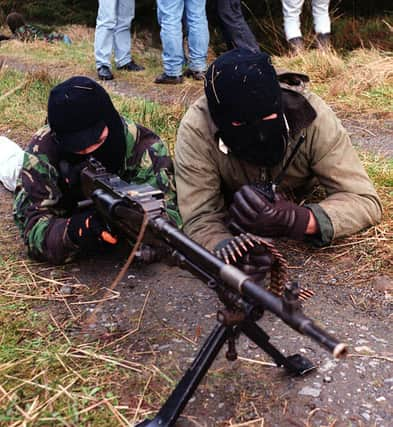Ben Lowry: Legacy will not focus on terrorism - the UK has no will for that


Mr Justice O'Hara found that David Holden pointed a gun at Mr McAnespie as he walked to a Gaelic match in 1988 and pulled the trigger, assuming it not cocked.
Mr McAnespie’s family now have some belated justice, although that will not bring back Aidan, 23.
Advertisement
Hide AdAdvertisement
Hide AdThe details of Mr McAnespie’s tragic death, or any other Troubles death, feed into the crucial debate about the past. How we are tackling legacy is in some respects complicated, in others simple.
The first simple truth is that none of the leaders of the IRA face any prospect of being brought to justice. It just won’t happen and won’t be allowed to happen.
There is no chance that Provisional leaders such as Brian Keenan, Kevin McKenna, Billy McKee and Martin McGuinness would be facing justice for their decades of calculated murder and mayhem if they were still alive.
We all know that if such men had been put in the dock to face a long trial there would have been uproar, and possibly even disorder.
Advertisement
Hide AdAdvertisement
Hide AdSuch terrorist godfathers were the beneficiaries of a ‘de facto’ amnesty: a mutual understanding across most of the political world that Mr McGuinness, for example, could not realistically be made deputy first minister of Northern Ireland, then being put on trial for a past which was widely known.
Yet soldiers are being tried for, in most instances, single shootings that, however reckless and despicable, lacked pre-meditation (let alone years of killings with daily, murderous and repeated pre-meditation).
All sorts of sophistry is used to imply that there is no imbalance against state forces in current criminal prosecutions for Troubles killings. But there is. A glaring imbalance (the web version of this article will link to an article in which I outlined why I think there is such an imbalance).
So that is the first simple truth of legacy – that while soldiers face trial, as do some low-ranking republican terrorists, no IRA leaders will do. Leaders of the most murderous organisation, the driving force in the Troubles until ending the violence at a time of its choosing, are exempt.
Advertisement
Hide AdAdvertisement
Hide Ad(When I say that influential people in London and Dublin have long been determined that such IRA leaders be exempt, I am not propagating a conspiracy theory but merely saying that the two establishments wanted to woo the men of violence into politics and keep them there).
The second simple truth of legacy is something that many unionist politicians, spokespeople for victims and for the security forces either have not yet realised, or not yet admitted: That any elaborate legacy process is going to turn against state forces.
Many people thought that the Historical Investigations Unit (HIU), which was going to be the biggest legacy body established under the 2014 Stormont House Agreement, might bring justice for victims of IRA terror (I keep citing IRA terror because it was by a distance the biggest killer of the Troubles, and also because it is republicans and their helpers who have pushed legacy). But it would not have done. It would have turned against state forces, for a few reasons.
The first reason is that the state and its forces have records and are easy to trace.
Advertisement
Hide AdAdvertisement
Hide AdThe second reason is that the HIU contained a specific provision that the RUC alone, who had killed far fewer people than the army, would have been subject to damnation for alleged past non criminal misconduct. This part of the HIU made the RUC particularly vulnerable to having their reputations destroyed without allegations against them being subject to proper examination.
It was, I believe, rooted in the hunt for collusion – the attempt to depict the UK and its security forces as murderous gangsters when the very opposite is true (they responded to the IRA campaign with exceptional restraint).
The third reason that the HIU would have turned against the state is the most important.
The overwhelming imbalance in non criminal legacy investigations against police and army (the massive inquiries such as Bloody Sunday and Ballymurphy, the police ombudsman probes, the legacy inquests which are almost all into state killings, and civil actions against the security forces) is leading to evidence that is then forwarded to prosecutors.
Advertisement
Hide AdAdvertisement
Hide AdAll of this could, in an instant, be overturned. The UK government presides over the fifth biggest economy in the world and could easily turn the tables and order sub criminal inquiries into IRA terror, which would in turn lead to files being sent to prosecutors.
It could, for example, order an inquiry into Ireland’s role in facilitating the IRA, above all by not extraditing known terrorists over 30 years, as a result of which so many border Protestants were slaughtered. But, despite being lectured to and harangued by the Irish government for its planned ‘amnesty’, London won’t do that either (despite the fact that Ireland above all has a flagrant de facto amnesty for IRA terrorists who live in its jurisdiction).
In fact, this week the government edged away from aspects of its legacy bill to appease its critics.
For example, it beefed up plans for the main mooted legacy body to carry out criminal investigations.
Some people think this might lead to light being shed on that killing machine, the IRA.
It will, a bit.
But not half as much light as will be shed on the forces the prevented civil war.